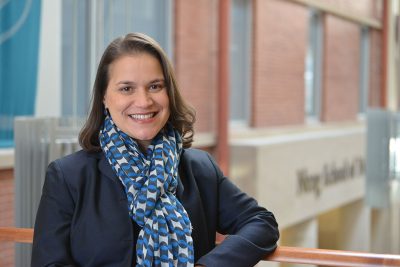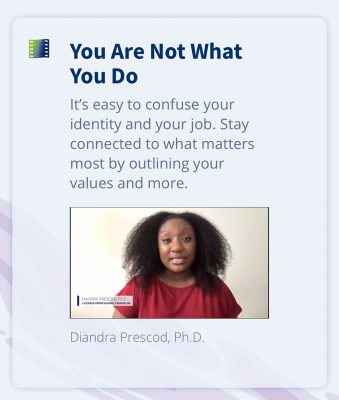NBC CT (Sandra Chafouleas interviewed)
VIDEO: Tip-Your-Cap Salute to Negro Leagues Centennial
ESPN (Doug Glanville narrates poem honoring baseball’s Black pioneers)
VIDEO: Educators Describe ‘Real-Time’ Learning
WFSB Channel 3 (Casey Cobb interviewed — 1:48)
Tenn.’s Overturned School Voucher Law Goes Before Appeals Court
Chalkbeat (Preston Green quoted)
$3M Grant to Train Students to Build More Resilient Landscapes

Editor’s Note: This story originally appeared on UConn Today. Milagros Castillo-Montoya, assistant professor, is among the core faculty serving on the grant.
Researchers from UConn and the Cary Institute of Ecosystem Studies have been awarded a $3 million grant from the National Science Foundation Research Traineeship (NRT) Program to fund a new program to help train graduate students in risk analysis to build resilient landscapes in the face urbanization and climate change.
The last century saw a precipitous rise in people moving from rural areas to cities. Growing urban areas, coupled with habitat degradation, resource exploitation, and the introduction of invasive species have coalesced to create major threats to food, energy, water, and ecosystem services, says Mark Urban, UConn Ecology and Evolutionary Biology Professor, Director of the Center of Biological Risk, and Principal Investigator of the grant.
This new program, titled “Building resilient landscapes for food, energy, water, and ecosystems in America’s megalopolis,” is aimed at training graduate students to understand, mitigate, and communicate these risks. Urban says UConn, nestled in the middle of the world’s first designated megalopolis, is uniquely positioned to study these issues.
“These grants are really the premier training grant for grad students and for research, particularly the STEM fields, going back for a long time.”
— Mark Urban, UConn Professor and Principal Investigator
Nighttime satellite photos of the East Coast show a glowing blanket of urban development, illuminating the land and banks of waterways. For the most part this twinkling sprawl is continuous, from Virginia all the way up to Maine, except for a couple of dark blips. One is the Hudson Valley, where the Cary Institute is located, and the other is an area often called “The Last Green Valley,” where UConn Storrs is located. UConn and the Carey Institute are in close proximity to heavily urbanized areas as well as some of the last wild and agricultural lands in the Northeast.
This vast and unnatural laboratory will give future NRT scholars an opportunity to hone new skills. The NRT grants are highly competitive; when he was a graduate student, Urban saw how they benefited trainees.
“These grants are really the premier training grant for grad students and for research, particularly the STEM fields, going back for a long time,” he says. “As a grad student I was always jealous of those students that had the ability to take part in them because they received such amazing training and experiences.”
Urban hoped to bring the NRT program to UConn, and now he and 20 other faculty members from departments across campus have made that a reality.
“The Center of Biological Risk is now in its fourth year and we were looking for things we could do for UConn and the state of Connecticut,” Urban says. “One of the great things we can do is train students to assess risks for the state and understand how to communicate them effectively.”
Urban says that risk analysis research and communication is especially relevant right now in the times of the COVID pandemic.

“Though we started the process of writing this proposal four years ago, today we are witnessing firsthand the importance of analyzing biological risks, how to manage those risks — which we are in the throes of now making lots of mistakes but also having some successes — and how to communicate those risks. How do we do that?”
Examples of projects that trainees can undertake include studying the implications for building solar farms for energy hungry cities at the expense of farmland to feed hungry humans, or studying tradeoffs between relocation vs. making densely populated areas close to the coast more resilient to sea level rise.
Urbanization is happening worldwide, and the hope is the training framework developed in this program could be adopted by other institutions to train even more students in this important skillset. Risk assessment is in high demand in the job market, and through the course of this grant scholars will gain knowledge that can be translated to other sectors in the workforce.
“In general, NSF is looking to support the development of new models for STEM graduate education – it’s not just about training grad students, but in developing a whole new way of educating the next generation of STEM students,” says Urban.
“We recognize that many of our graduate students do not go into academia, and there is a need for grad students all across the workforce, including businesses, nonprofit, and government. We want to give students the skills they need to thrive in any sense,” he adds.
Urban says the program will apply multiple educational methods through the two-year sequence. The approached is called Team TERRA, or Team-based, Transdisciplinary, Estimating Risks, and Real-world Analysis.
It will combine active collaborative learning through team projects. Students entering the program will be placed into separate risk teams where they will experience problem-based learning by working directly with governments, companies, and nonprofits on risk analysis problems.
“The students will be involved in real-life problem solving, working with stakeholders and coming up with a project that is useful to the community, so there is a strong service learning element,” he says.
Another vital component of the project is to address the need for more diversity in the field.
“It is certainly true that graduate students are less diverse than the general population and that is a barrier to overcome. We need to get the full diversity of insights into the creative pool of students,” says Urban. “Graduate students are the university’s fountain of ingenuity: they’re the ones that bring the novel ideas to the principle investigators and make them happen. They are also the ones that teach and inspire our undergrads to continue on in STEM and go on to get higher education as well.”
Urban adds that with ever-decreasing funding for grad students and fewer and fewer teaching assistantships in higher education, this program will be a good way to support a diverse group of scholars while teaching them the skills needed for a rapidly-changing world.
The development of this proposal was supported by UConn’s Center of Biological Risk and the Institute of the Environment. Core faculty on the grant include UConn’s Milagros Castillo-Montoya, Chris Elphick, Lisa Park-Boush, Margaret Rubega, Kathleen Segerson, Guiling Wang, Michael Willig, Chuanrong Zhang, and Stewart Picket of the Cary Institute of Ecosystem Studies. Additional participating faculty include Derek Aguiar, Kent Holsinger, Gene Likens, Nalini Ravishanker, Carl Schlichting, and John Volin.
$3M NSF Grant to Build Resilience in East Coast’s Megalopolis
UConn Today (Milagros Castillo-Montoya serves as core faculty on new NSF grant)
VIDEO: Connecticut Conversations — Is School Safe?
CPTV: Connecticut Conversations (Sarah Woulfin weighs in on sending kids back to school — 12:30)
AUDIO: The Great Grade-Change Caper
UConn 360 podcast (Rachael Gabriel interviewed)
Counseling Expert Strives to Support the Unemployed Amid COVID
In the wake of the COVID-19 outbreak, unemployment rates in the U.S. rose to their highest level since the Great Depression as of mid-April. Last week alone, the U.S. Department of Labor reported more than 1.4 million new unemployment claims.
Diandra J. Prescod, associate professor and program coordinator of counselor education and counseling psychology at the Neag School, is working to combat the obstacles faced by those Americans who have lost their jobs or been furloughed as a result of the pandemic. She wants them, first and foremost, to have hope.
Hope Central
Trained as a mental health counselor, Prescod has long been interested in career development and career counseling interventions. Her academic research has focused, for instance, on such areas as career development interventions for STEM undergraduate students and for women and students of color in higher education. In her most recent position at Penn State University, she was the program coordinator for the university’s career counseling program.
About a year ago, a colleague had invited Prescod to join in efforts led by Kuder, a career guidance solutions provider that offers tools and resources to people of all ages on career planning and lifelong learning, development, and achievement. Kuder seeks to support people across a wide range of ages and backgrounds – from supporting high schoolers in organizing their college application materials to making tools accessible to military veterans transitioning into the civilian workforce or the realm of higher education.
“We tend to feel more comfortable and more at ease when we feel a little bit more organized, when we can make sense of things and have some sort of a plan, and that’s what Hope Central does.”
—Diandra J. Prescod, Associate Professor
“They’re doing such great things when it comes to career guidance for people in K-12 and beyond,” says Prescod, who has since been serving on Kuder’s executive board alongside other faculty experts from across the country.
As COVID-19 took hold this spring, Prescod and fellow members of Kuder’s leadership discussed how they might be able to help the millions of individuals confronting layoffs and furloughs.
“At the time, none of us knew that much information as far as what was going on, how long this would last,” Prescod says. “But we just knew that people needed hope, and they needed some type of encouragement during this time.”
The result is a new project called Hope Central.

‘You are not what you do’
Taking a holistic approach, Prescod says, the team built a pool of resources and tools designed specifically to support people who had lost their jobs due to COVID-19. Within roughly six weeks, Hope Central was in place, offering information on where and how to file for unemployment benefits, a suite of videos for users on such topics as managing stress, connections to mental health services, and guidance on concrete steps individuals could take to gain a sense of control over their lives to the greatest extent possible. Corporations, states, and institutions of higher education are among those ensuring their employees have access to Hope Central’s services.
Many of those who now find themselves out of work, Prescod says, are unsure about their next steps. “Let’s start with making sure we’re keeping ourselves healthy and keeping our stress under control,” she says. “How can I start getting that résumé organized? What are some things that are in my control now that I can work on? I might not have control over when I’ll get back to work, but I can have control over my health, keeping myself safe, being positive, and working on my skills right now while I’m home. … We’re helping to expand that view for people so that they can get ready to really get back out there when the time is right.”
One of the videos Prescod created for Hope Central is themed “you are not what you do,” focusing on the idea that your career is not representative of your entire identity. “Especially in the States, where work is central to our lives,” she says, “we lead a lot of conversations with what we do because that’s so connected to who we are. We’re these amazing, whole individuals who are so much more than our work.”
Reflecting on our full selves, taking time to explore one’s past experience for transferable skills and learning how to build resilience against stress are all key to maintaining hope right now, according to Prescod.
“People need hope, and they need to know what their options are,” she says. “We tend to feel more comfortable and more at ease when we feel a little bit more organized, when we can make sense of things and have some sort of a plan, and that’s what Hope Central does.”
“I cannot overstate my appreciation for how Dr. Prescod has hit the ground running since we began our collaboration earlier this year,” says Phil Harrington, chairman and CEO of Kuder. “She has had a profound impact on our organization in terms of providing guidance and strategic direction in developing career planning solutions and self-care tools for individuals of all ages and life stages, across the globe. We rely on her not only as a sounding board and resource for the latest research, but for the countless ways that she contributes valuable insights and knowledge. In short, Dr. Prescod ensures that Kuder takes an inclusive approach in order to serve a much larger population of individuals than ever before, and in a meaningful and holistic way.”
‘I want people to feel heard’
Prescod and her colleagues are now looking to expand Hope Central to a new level, examining research findings in order to making the project more intentional as they plan for phase two.
“We know that COVID has disproportionately affected certain populations,” says Prescod, noting such examples as a 25% increase in domestic violence since the start of the outbreak, the disproportionate effect on unemployment numbers among Latinx populations, and race gaps in COVID-19 deaths.
Parents, meanwhile, may also be grappling with their children’s own sense of uncertainty or anxiety. Sustaining open communication, giving kids encouragement that acknowledges their talents or interests, and finding ways to expand kids’ options — for example, by introducing them to new books where they can find connections between themselves and others — can all have a positive impact, Prescod says. “With children being home a lot more, they still need to be able to engage and continue to connect with others,” she says.
“We’re paying attention to the research that is coming out and then continuing to tailor what Hope Central looks like to make sure that people can see themselves represented and heard through the content that we’re creating,” she says.
Ultimately, she and her Hope Central partners are striving to reach hundreds of thousands of people with the resources they have been developing.
“Whether you’re a person of color who’s been disproportionately affected, someone who thought they’d be retiring soon and has to rethink that, or someone feeling really alone in a situation where domestic violence is present, I want all of those individuals to feel represented,” she says. “That’s part of what we’re working on. I want people to feel heard.”
Learn more about Diandra J. Prescod’s work.
Former Baseball Player Doug Glanville Opens Up on Race, Sports, Career
Kiplinger (Doug Glanville featured in Q&A)
